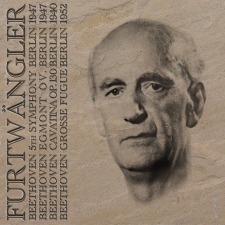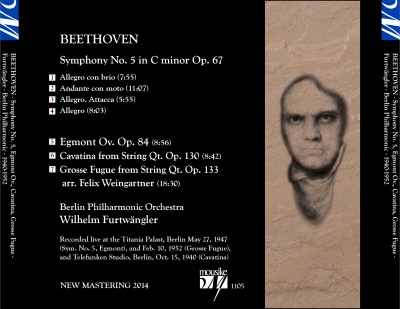 | Beethoven Symphony No. 5 in C Minor Op. 67 Beethoven Egmont Overture Op. 84 Beethoven Cavatina from Op. 130 Beethoven Grosse Fugue Op. 133 Berlin Philharmonic Orchestra - 1947 (May 27), 1940, 1952 $9 | ||
These two performances were remastered in August 2014. There is an improvement in sound, but more important is an adjustment in pitch for the symphony, which was lowered slightly since it was getting close to C sharp minor. Also there are adjustments in dynamics in both the symphony and the overture. Clearly, volume had been decreased for the climaxes so as not to saturate. In the Coda of the overture, there were at least three volume decreases during the performance. Both works now have a more "normal" relationship in dynamics. It is impossible to be sure exactly what the volume should be at each point, but it surely is closer to what it would have been in the concert.
The Cavatina and Grosse Fugue are visionary performances of works not usually part of the orchestral repertory. They are arrangements for string orchestra of works written for string quartet. They are among Beethoven's last works and, I believe, particularly well suited to Furtwängler's approach to this composer's music. The Grosse Fugue, in particular is such a grand interpretation that I have never heard a string quartet perform it in a way that can match the sheer dimension of this great work.
From Henry Fogel's review of this transfer: "I believe Chibás has the best of all for both dates. You can read in his interview the special relationship he had with this Fifth"
 |